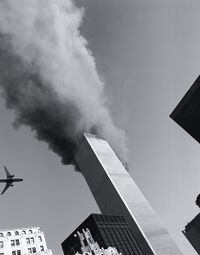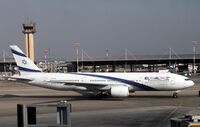Aviation safety
Aviation safety comprises tips and rules to ensure that commercial airline passengers arrive safely at their destinations. The rules of aviation safety continually undergo radical change for a variety of reasons.
Aviation before the rules of aviation safety was safer than, say, visiting a large metropolitan area and safer than driving your car to the airport. There were occasional hijackings, but the plane simply went to Havana and all the civilians were released safely (except for their complimentary meal of beans). The crew was held for ransom, but the Cubans generally only wanted something like a starter motor for a 1962 Corvair.
However, in the new century, new and more gruesome hijackings took place, and the bureaucracy devised rules, generally sufficient to prevent an exact recurrence of the most recent hijacking. When a new hijacker tried something different, it was back to the drawing board. This process accounts for the extreme complexity of modern aviation safety rules.
Prohibited objects and acts[edit]
Prohibited objects and activities have been around since the 1970s, when flight crews used to tell passengers during take-off and landing that they had to turn off electronics, stare forward, and follow all directions. The travel press clarified that your Sony Walkman or cassette player could interfere with the airplane's "avionics" and cause a devastating crash. Imagine the lawsuit liability the airlines would face if any of that were true and you could bring down a plane with a prank! Happily, it was all a lie; they simply wanted it to be easier to boss you around. But it did not eliminate the list; it only made it longer.
In modern life, everyone has a cellphone, and it is futile to tell passengers to turn it off, because that key job offer should be arriving any minute. In fact, airlines compete to offer the least flaky WiFi on board, as the in-flight movie loses something when you can't see the fight scene because the stewardess and the service cart are blocking the view. However, cellphones all come with a convenient Airplane Mode in which the cellphone mostly doesn't work, just like most other aspects of flying.
In Airplane Mode on the Samsung Galaxy Note 7, the cellphone can continue to perform its two signature functions: bursting into flames and throwing off sparks. So the Note 7 is banned from commercial flights. One prankster with an iPhone who named it "Note 7" is now also banned from flying.
These other articles and activities are also banned:
|
|
Certain activities are not banned but just strongly discouraged. This includes doing "number two" in the lavatory. Like all aviation safety rules, there is a good reason for this: Airlines famously jettison the holding tank to increase the airplane's maneuverability during final approach. There is a fair chance that liquids in the tank will vaporize in the few seconds before they freeze; whereas solids turn into noisome torpedos that can cause potholes, damage roofs, and deliver a particularly unpleasant death to pedestrians. Airlines discourage the practice by making meal portions microscopic and encouraging passengers to drink beer instead of, say, milk.
No-fly List[edit]
As the U.S. Constitution enshrines Americans' rights to be totally regulated by government, flying in the U.S. is subject to the No-fly List. Somehow, despite using X-rays and full-body scanners to render all passengers physically unable to do anything harmful, the flight crew still has to know exactly who you are. (Someone from New Hampshire questions this logic every other year or so. That person is not a "passenger.") However, there is a real purpose of checking your identity. It permits agents to compare you against the No-fly List.
The No-fly List is a knock-off of the concept of Digital Rights Management (DRM), which is the technology that makes software break when your WiFi goes out because it has to contact the home office to see if you have the "rights" to view that file. (Usually, you do if you make an additional payment.) DRM is what SD cards do with that 10% of storage space listed on the label that you can't actually use. The Federal Aviation Agency turned Digital Rights Management into Digital Flights Management. This foolproof system blocks all jihadis, other terrorists, and most other criminals; also anyone at all who has the same name as one of them, and key members of the out-of-power political party. The late Sen. Ted Kennedy was stopped from boarding several times, but rather than calling the system into question, he pulled his usual "Do you know who I am?" routine and the flight crew did. The reader is warned that the flight crew tends not to know who you are.
No one knows who maintains the No-fly List, only that there is no way to appeal if you find yourself on it. The No-fly List is always proposed as an alternative to new taxes or costly imprisonment when a politician identifies harmless conduct that truly merits punishment of some sort. Though you cannot get off the No-fly List, there are several useful things you can do if you find yourself on it. Such as, cry like a baby.
People on the No-fly List[edit]
|
|
[edit]
In 2020, when the Coronavirus pandemic began, aviation safety was especially affected. There are several reasons for this:
- State governors following the "guidance" of Dr. Anthony Fauci declared that most of the reasons you would get on a plane were "non-essential" and the aviation industry was wiped out.
- The flying public was convinced that the passenger cabin was a "closed system" where the air and everyone's germs were recycled indefinitely — which, if it were true, would mean the oxygen would be used up after ten minutes.
- The flying public was even more convinced that the usual person in the adjacent seat was a sweaty fattie who was infected but so stupid or inconsiderate as to go on a trip anyway and spread it to everyone.
The aviation industry got government payments to keep everyone on the payroll doing nothing, in case it would be needed at some point in the future. Eventually, the industry was re-started, and even later, the payments ceased. Bureaucrats were of course on the payroll doing nothing all along. They got a chance (working from home) to write additional rules. Masks were obligatory at all times, except maybe while spooning food into the mouth or spitting out a pit. However, cloth masks and knitted masks were fine. Only, the cloth masks could not have an anti-government slogan written on them.
Existing federal crimes against "interfering" with the flight crew were amended to include sidelong looks and grumbling when a stewardess orders you to do something patently stupid. Whether despite this or because of this, an unprecedented number of brawls broke out in the passenger cabin — each requiring an emergency landing so that the offender could be removed.
Finally, in 2022, when Joe Biden and his Democratic Party sensed that the rules might do to them what they had already done to Donald Trump, the Center for Disease Control looked at the caseload (which was five times what it was at the outset, mostly because they were testing five times as many people) and decided the "science had changed" and normality was the order of the day.
The last one to the table was Biden himself. He had used every federal agency to compel mask-wearing (as he himself did, mostly when alone on the White House lawn, and mostly not when "pressing the flesh" at a crowded banquet after coughing into his hand). Consequently, the FAA kept its mask mandate for flights.
Seeing a need for another gentle push, the chief executives of the ten largest airlines wrote to the President explaining that cabin air was filtered through hospital-grade HUBBA air filters. So rather than being the most unsafe air to breathe, airline air was actually the safest. If the executives had told Congress this at the outset of the outbreak, America could have warehoused Covid patients not in nursing homes where they gave thousands of war veterans their final infection, but in the seats of those jumbo-jets that were confined to their hangars.
Protect yourself[edit]
When flying, there is always the chance of terrorists killing passengers, hijackers taking over the cockpit, a baby that will just not stop crying, or that little brat in the seat behind you will not stop kicking the back of your seat and its parents won't listen to reason. All these things ruin your mood, so, how would one feel more safe (and comfortable) on the plane? Well, that's easy! You bring a gun, of course! And I know what you're saying; "guns are banned on planes you idiot", but you see, that's not my problem. If you do manage to sneak a firearm past the TSA, however, and some hijackers do try to take over the aircraft, you can shoot said hijackers, save the day, and become a national hero — before being shot by the air marshal for bringing a gun on a plane. I mean, c'mon, why would you bring a gun on a plane? Sounds like something a terrorist would do.
Another thing to be wary of is Republicans. People such as Ben Shapiro are said to "destroy the left-wing". It goes without saying, if one of the planes wings is damaged/removed/blown up, the plane is not going to function properly. Of course, this is only one side of a coin, as Democrats can board planes and then destroy the right-wing. In the rarest of events, if both wings were gone, the plane turns into a wingless, unguided missile, and crashes and burns, killing everyone on it regardless of ideology.



